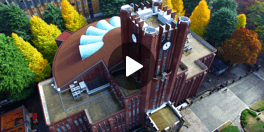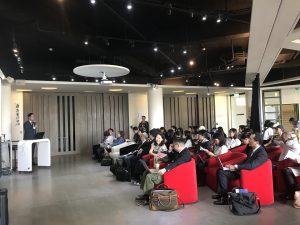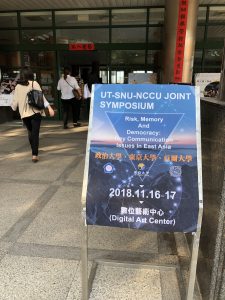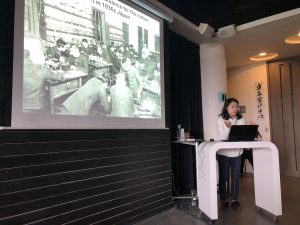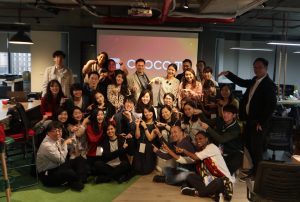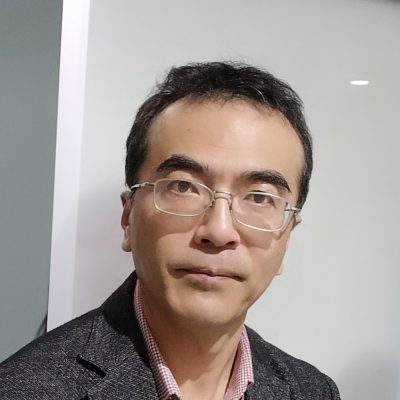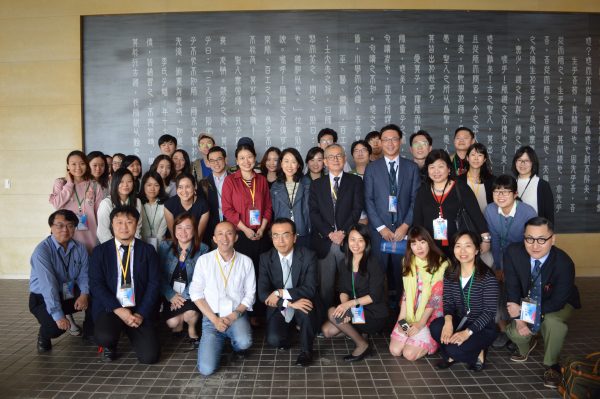
December 21, 2018
日韓台シンポジウム「RISK, MEMORY AND DEMOCRACY: Key Communication Issues in East AsiaThe UT-SNU-NCCU Symposium “RISK, MEMORY AND DEMOCRACY: Key Communication Issues in East Asia”
2018年11月16〜17日、日韓台シンポジウム「RISK, MEMORY AND DEMOCRACY: Key Communication Issues in East Asia」が、台湾の国立政治大学にて開催されました。このシンポジウムは、東京大学情報学環(以下、東大)とソウル国立大学言論情報学科(以下、ソウル大)の間で20年以上に渡り毎年開催されてきたもので、2016年から国立政治大学コミュニケーション学科(以下、政治大)が加わり、以降日本、韓国、台湾の3カ国間で、研究テーマと問題意識の共有と相互理解を目指したものです。シンポジウムは2部に分かれており、それぞれ教員・学生による研究発表が行われました。
Faculty Session
東大の田中淳先生は、東日本大震災での情報伝達における問題点から、災害における情報伝達のための機構の整備の必要性について発表されました。東大の関谷直也先生からは、東日本大震災後に生じた福島第一原発での事故に対する、近隣諸国の印象に関する調査の結果について報告され、日本国内・国外での事故に対する印象の違いについて議論が行われました。
政治大の許瓊文先生は、2014年に台湾の高雄市で生じた爆発事故後の、住民の災害に対する危機意識の実態についての調査結果を発表され、災害リスクを減らすための今後の指針について言及されました。政治大の林怡潔先生は、2001年より東港鎮にて毎年開催されている「Bluefin Tuna Cultural Festival」による、現地のマグロの消費量・食生活の変化に対する影響について報告され、さらに東港鎮の歴史、日本との関係性による影響について議論が行われました。
ソウル大のEun-Mee Kim先生は、インターネットニュースの共有のされ方に関する400名を対象にした統計結果の報告を行い、双方向・一方向、公開・非公開などの観点から分類されたメディアと、ニュースの拡散されやすさの関係について考察されました。ソウル大のKyu-Sup Hahn 先生は、支持を集める政党に偏りがある社会における、有権者の判断基準について、2017年の韓国大統領選などのデータを元に発表されました。
Student Session
昼食後、学生向けのセッションが行われ、三大学の学生が自分の研究を口頭で発表しました。学生たちは10分の発表を行い、全員の発表が終わった後に、同内容の発表を異なる観客に対して行いました。同じ内容を異なる観客に対して話すことで、様々な角度からのコメントが期待でき、また、自分の発表を振り返ることが出来るためです。
東大7名、ソウル大6名、政治大9名の全22名がプレゼンテーションを行いました。ソーシャルメディア、インターネットニュース、ジャーナリズム、女性史、教育史、建国の歴史、エンターテイメント、司法、災害社会科学など、社会学に関する多彩な研究発表が行われました。発表後に設けられた5分間の質疑応答の時間には、参加者それぞれの研究分野に立脚した質問がなされ、研究の発展可能性について様々な観点からの着想を得ることが出来たようでした。学生同士の活発な議論が見られ、互いに理解し合う雰囲気の強いシンポジウムでした。
Media Fieldtrip: Choco-TV
第2日目には、Choco-TV という台湾ではじめてのOTT (Over-the-Top) のベンチャー企業に訪問しました。OTT とは、インターネットによるテレビ番組の配信を行うサービスで、従来のテレビ放送とは異なり、テレビ局網などのインフラに頼らずに、様々な事業者がインターネットを通じて番組配信を行う仕組みです。Choco-TV のジェネラル・マネージャーである翁瑞廷氏が、Choco-TV の歴史、OTTの社会的な意義、台湾で人気の出る番組の作り方など、様々な観点から事業を紹介してくださいました。メディア、または隣接する分野を専門とする参加者が多く、熱心な質問・議論が行われ、例えば、権威のあるテレビ局からメディア配信を行うのではなく、ベンチャー企業として配信を行うことの意義についての議論が行われました。
懇親会、休憩時間などの合間にも、初めて出会う学生同士が自己紹介をしあい、発表についての個別な議論や、将来の研究の構想、日常的な事柄など、多様な会話がなされていました。3カ国で様々な観点から交流を深め、互いの国を知る機会になったことと思います。
英文校正:デイビッド・ビュースト(特任専門員)
・参加学生によるコメント
許豆任(修士課程)
日韓台シンポジウムへの参加は、今までぼんやりと思っていたメディア研究、広く言えばコミュニケーション研究への理解を深める機会になった。3つの大学の教員らの発表は、災害における情報発信、デジタルプラットフォームでの情報共有などのテーマで、日本・韓国・台湾各国の事例に照らした研究、また情報学理論を紹介していた。また、台湾と韓国の学生らの研究発表では、問題設定の多様性を実感した。文化的な背景のためか所属学部の伝統のためか、はっきりとは言えないが、研究問題の所在や、研究を進める観点が異なることが興味深かった。そのため、発表のあとのパーティーで台湾と韓国の学生たちとの会話を通じて、彼らの研究上の問題意識や学生生活を理解する機会になった。
石橋真帆(修士課程)
日韓台シンポジウム参加に当たって、一番に学んだことは研究発表の技術です。プレゼンテーションの授業においては、場面に応じた適切な言い回しや、スライドの見せ方について専門的に教えて頂いたので、英語のプレゼンのみならず、日本語においても普遍的な魅力ある研究発表の手法を知ることができました。さらに、私は英語が苦手で、最後まで流暢とは程遠い状態でしたが、それでも異なるメディア環境において研究を行う学生たちと意見を何とか交わし、新たな解釈に触れることができたこと、また、同じ学際情報学府にいても触れる機会の少ない他のコースや研究室の先生方、博士課程、修士課程の方々の発表を聞き、多様なテーマと研究手法を身近に知れたことは、自分の研究についてより俯瞰的な視点で考える重要な機会となり、貴重な体験だったと思います。
王詩芬(博士課程)
日韓台シンポジウムへの応募動機は、英語での発表に挑戦したかったです。更に、自らの研究を客観的な第三者から貴重なご意見とコメントを頂きたかったからです。今回参加して一番よかったと思う点は、他大学と深く交流ができたところです。台湾・韓国・日本からの学生にとって、唯一の共通言語は英語です。英語は皆の母国語ではないですが、質疑応答の際に頑張って英語で発言やコメントをする参加者の姿に本当に感激しました。語学が上手かどうかは関係なく、積極的に自らの意見を語り合ったり、お互いを励まし合ったりすることが非常に印象的でした。そして、一番感謝したいのはビュースト先生のInternational Conference Presentationという講義です。システム的にプレゼンテーションのスキルを伝授してくださったり、スライド作成する際の注意事項を丁寧に教えてくださり、大変役に立ったトレーニングでした。
薛欣怡(博士課程)
台湾出身の私、初めて留学生として母国で交流活動に参加しました。あまりに面白い位置ですから、私は私のことを留学生とは知らない会場の二人の受付係員が中国語で「彼女は日本人っぽくない」と会話しているのが耳に入りました。「そうですよ、台湾人です、東大で留学しています」と答えました。この時初めて感じました、留学生になれて良かったです。台湾の文化はもちろん、日本の文化や言葉も少しずつ勉強してきました。今では通訳もできますし、東大からのメンバーに台湾料理のお弁当も紹介できました。久しぶりの空、変わらずの強い日差しを舞台に、このような3国の研究交流が成功して本当に良かったと思います。学際的な知識のみならず、国際的な視野も得ることができました。
神谷説子(博士課程)
このシンポジウムへの参加は自分の研究を俯瞰する大変良い機会になりました。異なる文化背景を持つ方々を意識して英語で発表すること、しかもペチャクチャ方式で行うというのは思った以上に難しかったですが、準備の段階から得たものは多かったです。台湾訪問も国際シンポジウム参加も初めてでしたが、各大学のファカルティや学生同士の発表を通じて「メディア」や「コミュニケーション」をキーワードに研究しあう親近感を覚えたと同時に、日本と台湾と韓国の文化的な近さや違いに触れてとても刺激的でした。そして歴史を学ぶ重要性も改めて痛感しました。ホストの国立政治大学のファカルティは女性が多く登壇されたのも印象的でした。肝心の研究発表は、ひたすら緊張した1回目を経て2回目は舌足らずだった部分を補いながらリラックスして臨め、お互いに研究内容に対する理解が進んだことで質疑応答も活発になりとても楽しかったです。
The UT-SNU-NCCU Symposium “RISK, MEMORY AND DEMOCRACY: Key Communication Issues in East Asia” was held at National Chengchi University (NCCU) in Taiwan on November 16th and 17th, 2018. This symposium has over 20 years of history since the University of Tokyo (UT) and Seoul National University (SNU) first started the symposium. NCCU joined the convention in 2016. The symposium aims to share awareness toward research topics between Japan, Korea and Taiwan. The symposium consisted of two sections; one was a faculty session, and the other was a student session, in which faculty members and students respectively gave oral presentations on their research.
Faculty Session
Prof. Atsushi Tanaka from UT presented solutions toward effective evaluation planning as well as communication of disaster information with reference to the 2011 Great East Japan Earthquake. Prof. Naoya Sekiya from UT presented his international comparative study on risk perception after the accident at the Fukushima nuclear power stations.
Prof. Chiung-Wen Hsu from NCCU presented her study on residents’ awareness about disasters with reference to a massive explosion that happened in the Cianjhen and Lingya districts of Kaohsiung city, discussing possible solutions to residents’ neglect of disasters. Prof. Yi-Chieh Lin from NCCU presented her research on changes in the production and consumption of tuna in Donggang in relation to the “Bluefin Tuna Cultural Festival” that is held annually in Donggang town.
Prof. Eun-Mee Kim from SNU presented her research on the diffusion of online-news articles, revealing relationships between types of media (unidirectional vs bidirectional, open vs closed) and types of online-news (highly controversial vs moderately controversial). Prof. Kyu-Sup Hahn from SNU presented his research on voting trends in a highly polarized democratic society with reference to the 2017 presidential election in South Korea.
Student Session
After a lunch break, a student session was held, in which students from all three universities gave 10-minute oral presentations. Each student gave his or her presentation twice, each time before a different audience. This enabled them to reflect on their own presentation and also to obtain comments from multiple viewpoints.
22 students gave presentations: 7 from UT, 6 from SNU and 9 from NCCU. The presentations covered various topics in the social sciences, including social media, online news, journalism, history of women, history of education, history of nations, entertainment, law, and disaster social science. During the 5-minute long question and answer time, the audience posed diverse questions on the basis of their own research topics.
Media Fieldtrip: Choco-TV
On the second day, the participants visited the office of Choco-TV, which is the first OTT (Over-the-Top) media service company in Taiwan; OTT refers to content providers which broadcast television contents not via infrastructure for television platforms, but via the Internet. Jerry Weng, who is a general manager and co-founder of Choco-TV, introduced the history of Choco-TV, its significance in comparison with other media services, and tips to create attractive TV programs. Since most of the participants’ research areas were closely related to media issues, many questions were asked and the discussion was lively. Among other topics, they discussed the importance of broadcasting from OTT not from authorized TV stations.
During breaktimes, participants talked about their research interests, future research plans and more casual matters. This visit will contribute to further friendship between NCCU, SNU and UT.
Proofreading: David Buist(Project senior specialist)
– Comments from Students
Wu Zihan (MA student)
This trip to Taipei was the first time for me to step onto the ground of Taiwan, which turned out to be a great chance for me to re-examine the history, society, identity and so forth in Taiwan. Such experience is enlightening and inspiring in the way of seeing and understanding Asian culture and history in a different light. At the same time, it lent us a perfect opportunity to discuss current affairs and social problems with students from different countries and regions; even the chat with the taxi drivers during the trip shed light on my understanding about what people there are actually thinking now, which helped to open my mind and deepen my horizons.
Meanwhile, as a student who took journalism and communication as a major when I was an undergraduate, the symposium represented itself as a chance to follow frontier knowledge in media studies by providing beautiful speeches from the professors and fascinating presentations from other students. The process of explaining my topic to students from different social and cultural contexts offered the opportunity to scan with fresh eyes and polish my own research in a more thoughtful manner.
Yang Yue (MA student)
The symposium held in Taiwan Chengchi University centered on communication issues in Asia. In addition to the report session, we visited Choco TV, an over-the-top media services provider, to understand how the media company functions practically. This experience enriched my knowledge not only on the service itself but also lent me insight on Taiwan and its business culture. The Taiwanese model of development strongly relies on a vibrant entrepreneurial culture and small but flexible companies. Choco TV, a start-up company with 30 employers, facing competition from mainland China, the US and other big Taiwanese companies, strives to survive in the market. Except for Choco TV, another prominent example is the current president Tsai Ing-wen’s father who built his business and wealth on the private-run car-repairing industry. The geographical environment of Taiwan boosts the entrepreneurial spirit. Surrounded by the sea, Taiwanese people have low-risk avoidance; they put their words into actions, and they are not afraid of failure. That is why the founders did not give up because of failing 15 times before they came up with the idea of Choco TV.
Huh Duim (MA student)
Participating in the UT-SNU-NCCU symposium was an opportunity to understand the research concerns of information studies in different Asian countries. In presentations by faculty, I learned about various research topics in the three countries, such as circulating information on disasters and publishing and sharing information on digital platforms. These various examples related to a wide range of theories in communication and media studies. Also, students’ presentations from Taiwan and South Korea gave a deep impression. Their perspectives on making research questions and analyzing their materials seemed to be different from my own. After I had long conversations with the other participants, finally I realized that researchers’ concerns are related to their social and cultural backgrounds.
Maho Ishibashi (MA student)
The most important thing I learned from the Taipei symposium was the technique of presentation. In a class on international conference presentation, we were taught about the academic style appropriate for several situations, and the way of making slides, allowing us to learn about tips for attractive academic presentation which could also apply to presentation in Japanese.
In addition, although I could not speak English fluently, it was a very precious opportunity to consider my research with a wide perspective, because I had conversations with students who were studying in different environmental contexts of media, and I was able to hear interpretations that had never occurred to me. Furthermore, it was also an interesting experience for me to hear about the others’ research, such as research of professors, doctoral students and master students from other labs, which was not familiar to me in spite of their belonging to the same institution.
Hsin Yi Hsueh (PhD student)
It was my first time to attend an international symposium in my home country of Taiwan as a student studying abroad. As a presenter from the University of Tokyo, I tried to share Taiwan’s culture for my team workers who come from Japan, South Korea and China. Through this event, we extended not only our knowledge but also our international views. Besides, the most impressive thing from this symposium is that we put in a lot of effort to prepare for the presentation. Our whole team started to prepare our presentations 2 months earlier. It was valuable to attend the course given by Prof. Buist because we earned a lot of compliments from the other universities.
Shih-Fen Wang (PhD student)
I joined the symposium because I wanted to do the presentation in English and learn from other people’s different perspectives for my research. The best thing that I took away from my time at the event was that I had a great opportunity to interact with participants from different universities. For participants from Seoul, Taiwan and Japan the only common language for us to communicate with was English. Whether our English was good or bad, we actively gave feedback and encouraged each other. The one person who I would like to show my appreciation the most is Professor Buist. He systematically taught us presentation skills and guided us on how to make our presentation slides have the most impact. Those skills and tips will benefit me for a long time.
Setsuko Kamiya (PhD Student)
The symposium in Taipei was a great learning experience on so many levels! Preparing my presentation for an international audience and also with the “Pecha-Kucha” style was more challenging than I had initially imagined, but it actually helped me develop a bird’s-eye view toward my own research. Being introduced to the research works of media and communication scholars in Japan, South Korea and Taiwan was a unique way to realize and appreciate our common academic interests, cultural similarities and differences. I really enjoyed the discussions with other participants and am grateful that they have given me valuable insights. Last but not least, I would like to appreciate the faculty and students of the National Chengchi University for their hospitality!
主担当教員Associated Faculty Members
教授
前田 幸男
- 文化・人間情報学コース
- アジア情報社会コース
Professor
MAEDA,Yukio
- Cultural and human information studies course
- ITASIA program

